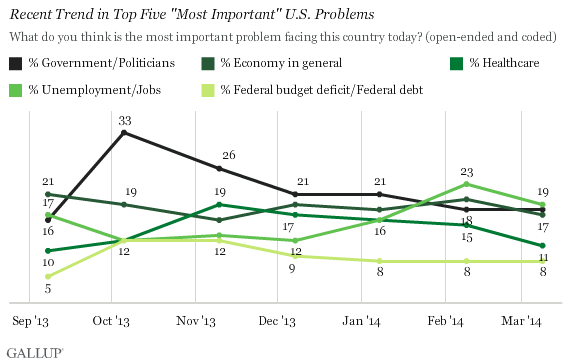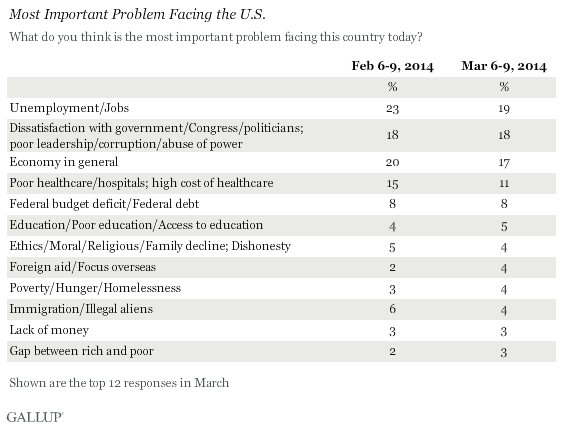WASHINGTON, D.C. -- Three issues -- unemployment, the economy in general, and dissatisfaction with government -- dominate when Americans name the most important problem facing the nation. Nineteen percent mention unemployment or jobs, 18% say dissatisfaction with government, and 17% the economy in general. Unemployment edged out the other two issues in February, but dropped slightly in March.

In the midst of the federal government shutdown in October 2013, dissatisfaction with government and politicians jumped up to the top of the "most important problem" list. But mentions of dysfunctional government settled back down by February and are now on par with mentions of the economy and unemployment.
In the latest poll, conducted March 6-9, the percentage who cite healthcare dropped to where it was in October, while concerns about the federal budget remained stable for the third month in a row. The percentages mentioning other issues such as education, ethics, and poverty remain at levels similar to February's.

Americans mentioned a few other issues related to recent news developments more frequently than in the previous month, although still only a small percentage mentioned them. One percent of Americans named the situation with Russia as the most important problem, and 2% listed war. Russia was not mentioned in February, while 1% mentioned war last month. These small increases may be linked to recent international developments such as the conflict in Ukraine. Gallup research shows that Americans are paying a relatively high level of attention to the situation in Ukraine, but clearly they do not perceive the situation as grave enough to consider it a top problem.
In a separate question that Gallup recently reported, Americans said they worried most about the economy, federal spending, and healthcare, and then unemployment, when asked to rate their level of worry about 15 issues. Together, these findings confirm the primacy of the economy and unemployment, as well as government, as the issues that most concern Americans today.
Implications
Unemployment, the economy, and the government dominate as Americans' top concerns about the major issues facing the country. Separately, Gallup recently reported that Americans say they worry most about the economy, federal spending, and healthcare when asked to rate their level of worry about 15 issues. Together, these findings confirm that regardless of how the question is asked, the economy and government are the issues that most concern Americans today.
International issues in the news, such as the large-scale protests in Venezuela and the crisis in Ukraine, are currently not major concerns for most Americans. President Barack Obama has pledged to lessen wage gaps and make other measures to combat income inequality, but the public remains more concerned with finding good jobs and lowering the unemployment rate.
Survey Methods
Results for this Gallup poll are based on telephone interviews conducted March 6-9, 2014, with a random sample of 1,048 adults, aged 18 and older, living in all 50 U.S. states and the District of Columbia.
For results based on the total sample of national adults, the margin of sampling error is ±4 percentage points at the 95% confidence level.
Interviews are conducted with respondents on landline telephones and cellular phones, with interviews conducted in Spanish for respondents who are primarily Spanish-speaking. Each sample of national adults includes a minimum quota of 50% cellphone respondents and 50% landline respondents, with additional minimum quotas by time zone within region. Landline and cellular telephone numbers are selected using random-digit-dial methods. Landline respondents are chosen at random within each household on the basis of which member had the most recent birthday.
Samples are weighted to correct for unequal selection probability, nonresponse, and double coverage of landline and cell users in the two sampling frames. They are also weighted to match the national demographics of gender, age, race, Hispanic ethnicity, education, region, population density, and phone status (cellphone only/landline only/both, and cellphone mostly). Demographic weighting targets are based on the most recent Current Population Survey figures for the aged 18 and older U.S. population. Phone status targets are based on the most recent National Health Interview Survey. Population density targets are based on the most recent U.S. census. All reported margins of sampling error include the computed design effects for weighting.
In addition to sampling error, question wording and practical difficulties in conducting surveys can introduce error or bias into the findings of public opinion polls.
View survey methodology, complete question responses, and trends.
For more details on Gallup's polling methodology, visit www.gallup.com.
